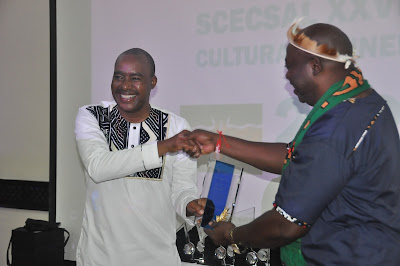 |
Participants from the Uganda Library and Information
Association at the 2012 SCECSAL Cultural
Evening in Nairobi, Kenya |
The Kenyan Library Association has released the program for the XXVIth SCECSAL Conference, scheduled to take place in the vibrant coastal city of Mombasa, Kenya, from 22 to 26 April 2024, at the picturesque
PrideInn Paradise Beach Resort, Convention Centre & Spa.
Kicking off the conference on Monday, 22 April is Prof. Clara Chu, Director and Mortenson Distinguished Professor at the Mortenson Center for International Library Programs, University of Illinois Urbana-Champaign, USA. Prof. Chu's keynote address, titled “Our Libraries and Our Communities in the Digital Era: Re-imagining Services with Intention,” sets the tone for the innovative discussions to follow.
More than 60 papers are scheduled to be presented, with speakers coming from the United States, Thailand, Namibia, South Africa, Uganda, Zambia, Malawi, Kenya, Tanzania, among other countries.
Among the highlights of the conference are two special sessions: one focusing on SCECSAL@50 and the other on Sustainable Development Goals (SDGs) and Libraries. In these sessions, participants will discuss the development of SCECSAL since its establishment in 1974, the successes scored, and challenges faced. They will also share inspiring stories and experiences about how libraries are actively contributing to the achievement of the SDGs, fostering community development, and empowerment.
On Wednesday, April 24th, participants will have the opportunity to engage in enriching training sessions designed to enhance their skills and knowledge in key areas. Prof. Chu will lead a training workshop on 'Strengthening Innovative Library Leaders: Cultivating Your Leadership Style and Library Sustainable Development,' while Prof. Omwoyo Bosire Onyancha from the University of South Africa will deliver a training session on 'Harnessing Research Impact in Library Practice.' These sessions are open to conference participants, and the number of seats is very limited.
On Wednesday, there will also be a meeting of the Standing Conference of African National and University Librarians-Eastern, Central & Southern (SCANUL-ECS), as well as a tour of Mombasa.
As the sun sets over the Indian Ocean, Wednesday will culminate in a Cultural Evening, during which 19 individuals will be honored for their outstanding contributions to library and information sciences in the SCECSAL region. These individuals have played pivotal roles in advancing SCECSAL's mission and have tirelessly worked towards the development of libraries and information services in their communities.
The SCECSAL Cultural Evening also offers participants the opportunity to showcase their national dress and compete in the dancing competition
On Thursday, April 25th, the conference continues with parallel sessions on 'Responsive Information Service and Products,' 'Information Ethics and Practices,' and 'Technology and Innovation'.
On Friday, April 26th, the day begins with a session on SDGs and Libraries, which will include presentations on SDGs and library initiatives, the sharing of stories related to SDGs and libraries, and a panel discussion by practitioners highlighting initiatives aimed at contributing to the achievement of the SDGs in countries within the SCECSAL region.
The XXVIth SCECSAL Conference promises to be a dynamic and inspiring event, bringing together passionate professionals dedicated to shaping the future of information services in the digital era. We look forward to welcoming you to Mombasa for what is sure to be an unforgettable experience!
For more information and to register, visit SCECSAL's conference website. See you in Mombasa!
Download a copy of the conference programme HERE!























